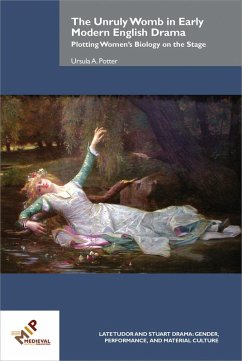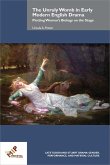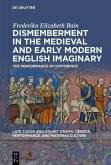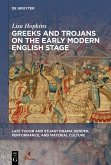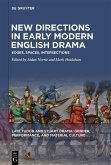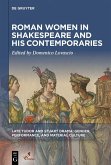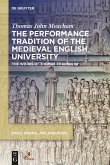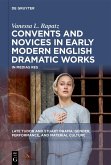This study provides an accessible, informative and entertaining introduction to women's sexual health as presented on the early modern stage, and how dramatists coded for it. Beginning with the rise of green sickness (the disease of virgins) from its earliest reference in drama in the 1560s, Ursula Potter traces a continuing fascination with the womb by dramatists through to the oxymoron of the chaste sex debate in the 1640s. She analyzes how playwrights employed visual and verbal clues to identify the sexual status of female characters to engage their audiences with popular concepts of women's health; and how they satirized the notion of the womb's insatiable appetite, suggesting that men who fear it have been duped. But the study also recognizes that, as these dramatists were fully aware, merely by bringing such material to the stage so frequently, they were complicit in perpetuating such theories.
Dieser Download kann aus rechtlichen Gründen nur mit Rechnungsadresse in A, B, BG, CY, CZ, D, DK, EW, E, FIN, F, GR, HR, H, IRL, I, LT, L, LR, M, NL, PL, P, R, S, SLO, SK ausgeliefert werden.
"[The book] really is a terrific piece of work. [The] research was incredibly thorough and wide-ranging and [the] fascinating line of argument gave me lots of new insights into the Shakespeare plays that [were] discussed. I only wish that material like this had been made available when I studied English all those years ago at Sydney University. Here's hoping the book attracts the wide readership and favourable reception that it deserves."
Michael Chesterman, Emeritus Professor of Law, University of New South Wales
___
"[T]he book constitutes an excellent contribution to the field of early modern literary studies and especially to studies of the representation of the female body (embodied as it was by a male actor) on the early modern stage."
Iman Sheeha, Brunel University London, UK
___
Iman Sheeha (@iman_sheeha) tweeted:
"My review of The Unruly Womb in Early Modern English Drama: Plotting Women's Biology on the Stage, written by Ursula A. Potter is out. Such a good book. Highly recommend."
___
"[...] Ursula A. Potter's book [...] successfully demonstrates the powerful role that theatre played in reflecting social and sexual politics of the time, and the crucial role that female biology and sexuality played in early modern English society. The high volume of plays that respond to the subject, either in a determinedly positive tone or a satirical one, enables Potter to persuasively demonstrate not only the vital importance of the womb in early modern gender politics, but the various coded practices that playwrights adopted to discuss female fertility and the archetypal characters that correspond to and enact them. [...] While the book examines in detail the work of Fletcher and Shakespeare, the comprehensive appendix evidences that this was a wider trend amongst contemporary playwrights and is a vital, comprehensive, and accessible addition for anyone wishing to carry out further research in this field." (Elizabeth Moroney, in: "Renaissance Drama: Excluding Shakespeare", by Steve Bull, Lakshmi Balakrishnan, Elizabeth Moroney, Cristiano Ragni, Alice Equestri, This Year's Work in English Studies 2021, 21-22)
___
"[...]. In using literature as historical evidence, Potter shows resource and originality. [...] Through her wide and careful reading of texts and contexts, she is a sure-footed guide to contemporary understandings of female biology [...]. She makes significant contributions to the history of medicine both in points of detail, especially in gynaecology, and by offering new insights on attitudes to the medical profession and the interpenetration of learned and popular medical discourse." (Michael Bennett, in: Health & History, 23/2, 2021, 115)
Michael Chesterman, Emeritus Professor of Law, University of New South Wales
___
"[T]he book constitutes an excellent contribution to the field of early modern literary studies and especially to studies of the representation of the female body (embodied as it was by a male actor) on the early modern stage."
Iman Sheeha, Brunel University London, UK
___
Iman Sheeha (@iman_sheeha) tweeted:
"My review of The Unruly Womb in Early Modern English Drama: Plotting Women's Biology on the Stage, written by Ursula A. Potter is out. Such a good book. Highly recommend."
___
"[...] Ursula A. Potter's book [...] successfully demonstrates the powerful role that theatre played in reflecting social and sexual politics of the time, and the crucial role that female biology and sexuality played in early modern English society. The high volume of plays that respond to the subject, either in a determinedly positive tone or a satirical one, enables Potter to persuasively demonstrate not only the vital importance of the womb in early modern gender politics, but the various coded practices that playwrights adopted to discuss female fertility and the archetypal characters that correspond to and enact them. [...] While the book examines in detail the work of Fletcher and Shakespeare, the comprehensive appendix evidences that this was a wider trend amongst contemporary playwrights and is a vital, comprehensive, and accessible addition for anyone wishing to carry out further research in this field." (Elizabeth Moroney, in: "Renaissance Drama: Excluding Shakespeare", by Steve Bull, Lakshmi Balakrishnan, Elizabeth Moroney, Cristiano Ragni, Alice Equestri, This Year's Work in English Studies 2021, 21-22)
___
"[...]. In using literature as historical evidence, Potter shows resource and originality. [...] Through her wide and careful reading of texts and contexts, she is a sure-footed guide to contemporary understandings of female biology [...]. She makes significant contributions to the history of medicine both in points of detail, especially in gynaecology, and by offering new insights on attitudes to the medical profession and the interpenetration of learned and popular medical discourse." (Michael Bennett, in: Health & History, 23/2, 2021, 115)

